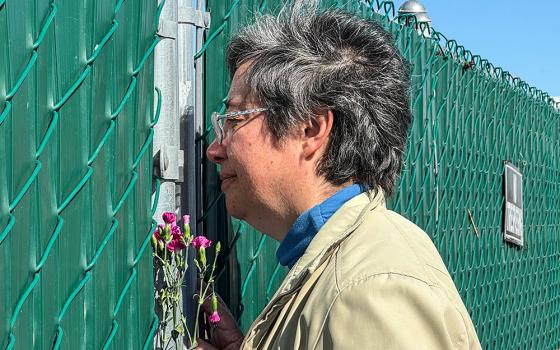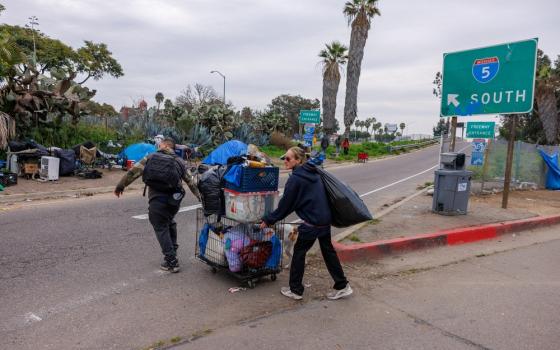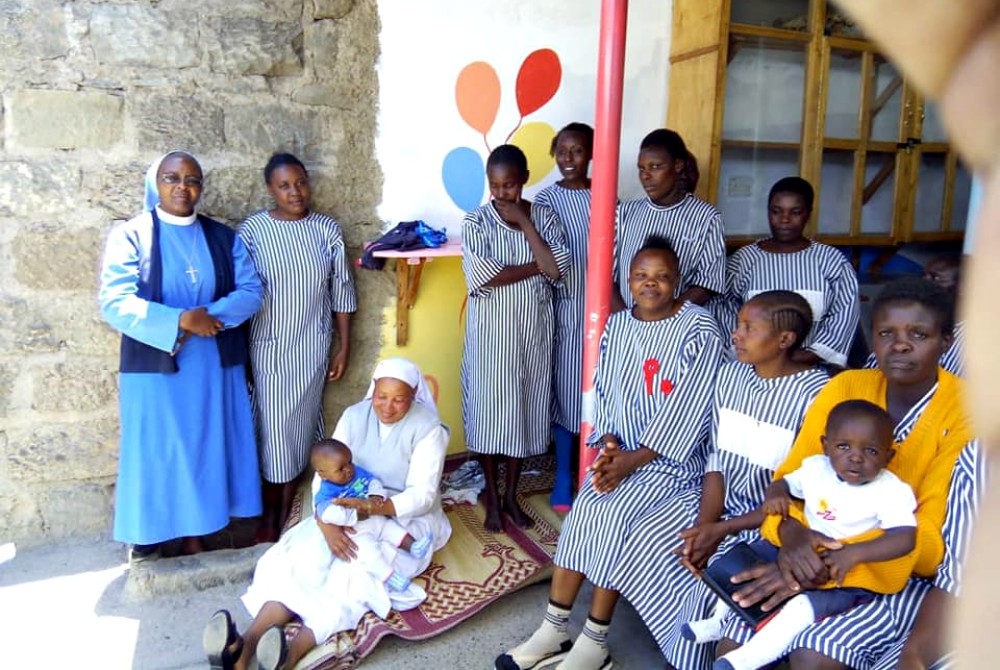
Dimesse sisters visit inmates at Nyahururu’s Thomson Falls Women’s Prison in Kenya. Some of the inmates here are taking care of their children while in prison. (Courtesy of the Dimesse sisters)
In this small town of central Kenya, sisters from the Dimesse congregation are transforming the lives of prisoners and their families by helping them find solace after loss and a relationship with Christ.
Every week, the sisters collect unused Bibles from donors and distribute them to inmates at Nyahururu's Thomson Falls Women's Prison and make Christian books accessible to them through the prison libraries. They donate food to the prisoners received from the surrounding communities and also help integrate those who are released back into the community.
"We have been called to serve God by serving others," said Sr. Joyce Nyaga, who is leading the drive to change the lives of prisoners in the region. "It's our responsibility as Christians to bring hope to those who are suffering. It's part of our charism."
The East African nation has about 54,000 prisoners (out of a population of 51 million) housed in 118 correctional facilities, including Thomson Falls Women's Prison, many remanded and convicted for petty offenses, according to a recent report by Kenya's Ministry of Interior and Coordination of National Government.
The conditions that inmates live under are dire, according to the latest report by the Kenya National Commission on Human Rights. The report illustrates that hygiene standards are low and many prisoners get sick. Food rations, sanitary products and even water are in limited supply.
Many of the inmates often face rejection from members of society after they are released from prison. Up to 70% of all released prisoners are rearrested within three years, and the lack of mental health care in prisons plays a significant role in this high rate of reoffending, according to a 2018 report by World Prison Brief, an online database that provides free access to information on prison systems around the world.
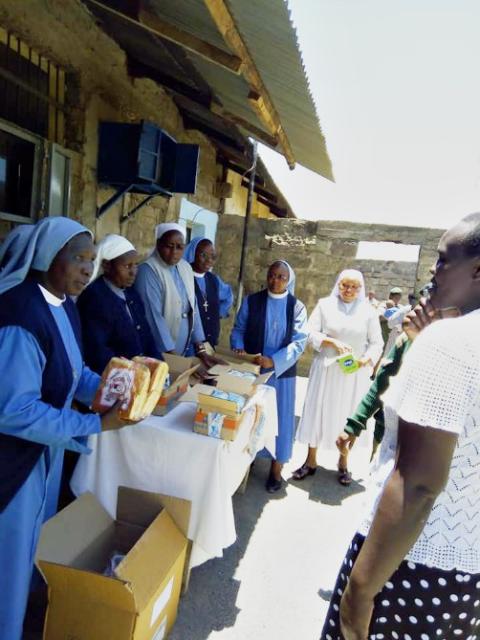
Sisters donate food and sanitary items to female prisoners at Nyahururu's Thomson Falls Women's Prison in Kenya. (Courtesy of the Dimesse sisters)
Nyaga and dozens of other nuns are helping address the plight of those who are behind bars. Apart from being provided with food, underwear, sanitary pads, Bibles and basic health services, prisoners are taught management skills and offered thorough spiritual coaching and behavioral change sessions, she said.
Recently, Nyaga and other sisters visited Thomson Falls Women's Prison to give hope and opportunity for transformation, encouraging inmates to forgive those who wronged them and turn their lives over to God.
"We have sessions where we train prisoners to ensure they are better people when they leave jail," said Nyaga, who is also a trained caterer. "Some prisoners have already turned their life to Christ after hearing the word of God. We are training others on leadership skills to help them when they leave prison."
An ex-prisoner, Joan Waithera, who recently completed her 15-year prison term, says the skills she learned from theology behind bars transformed her life among people in her community and those in prison.
"I made sure that I put into practice the skills learned in spreading the Gospel of good news aimed towards transforming the lives of prisoners and the people in my community. I regularly visit inmates to spread the Gospel and encourage them to always have hope in Christ."
Nyaga and her team of the Dimesse sisters — a Daughters of Mary Immaculate congregation — regularly visit prisons in the region to conduct prayers, Bible studies, and answer questions on matters of Catholic doctrine and practice. They also give out prayer cards and rosaries to the inmates who attend Mass to help them in their spiritual growth.
"We tell them their lives can change and God is giving them a second chance," said Nyaga. "We use the opportunity to also help prisoners who confess that they are Catholics to understand doctrines of the faith. Many have said they conduct prison apologetics [repentance sessions], which has really changed their lives."
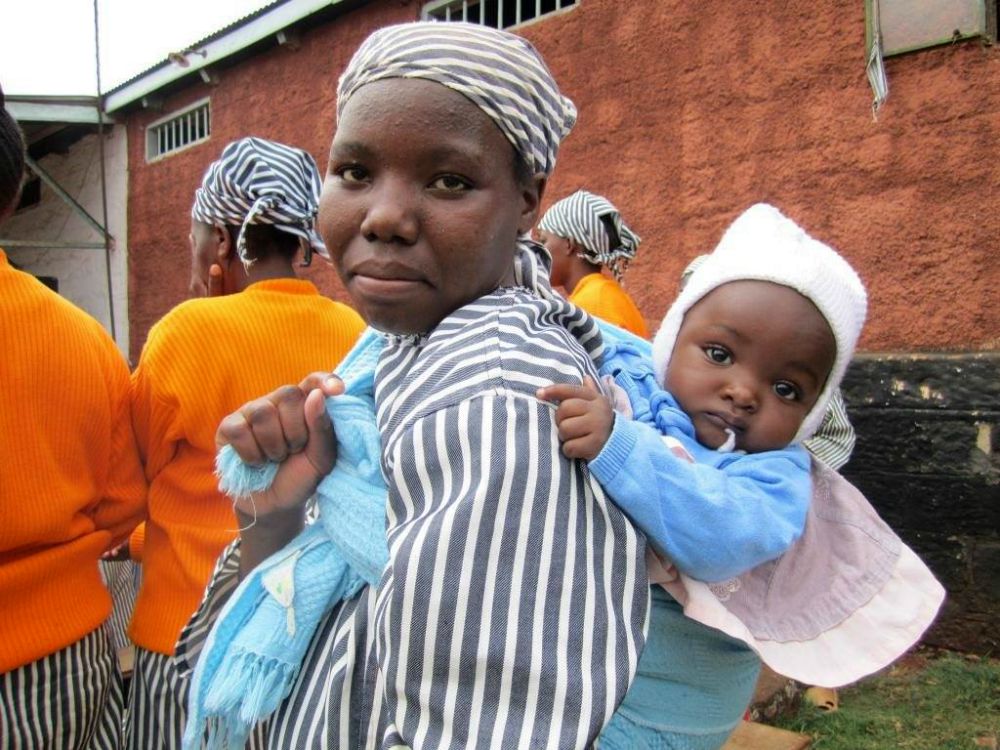
An inmate attends a prayer event at Langata Women's Prison in Nairobi, Kenya. (Courtesy of the Dimesse sisters)
Sr. Redemptor Ikonga, who is part of the team, noted that while there are credible education and rehabilitation programs in some penal institutions, spiritual education to prisoners was paramount as most of them are forgotten once they're locked away and shunned by their communities for the offenses they committed before being arrested.
"You need to tell those [prisoners] why everything is happening different in their lives," Ikonga said. "They need to know about the love of God in their lives. When God finally heals their deep emotional wounds and conflicts, they definitely become productive in society."
The sisters' efforts have been fruitful.
Thousands of inmates have found their faith while in jail and others have left prison reformed and better skilled to earn a living on the outside.
Sr. Eunice Mokua of the Little Sisters of St. Joseph in Kenya said the regular visits by the sisters and other partner organizations have really changed the lives of women and men prisoners in Nyahururu.
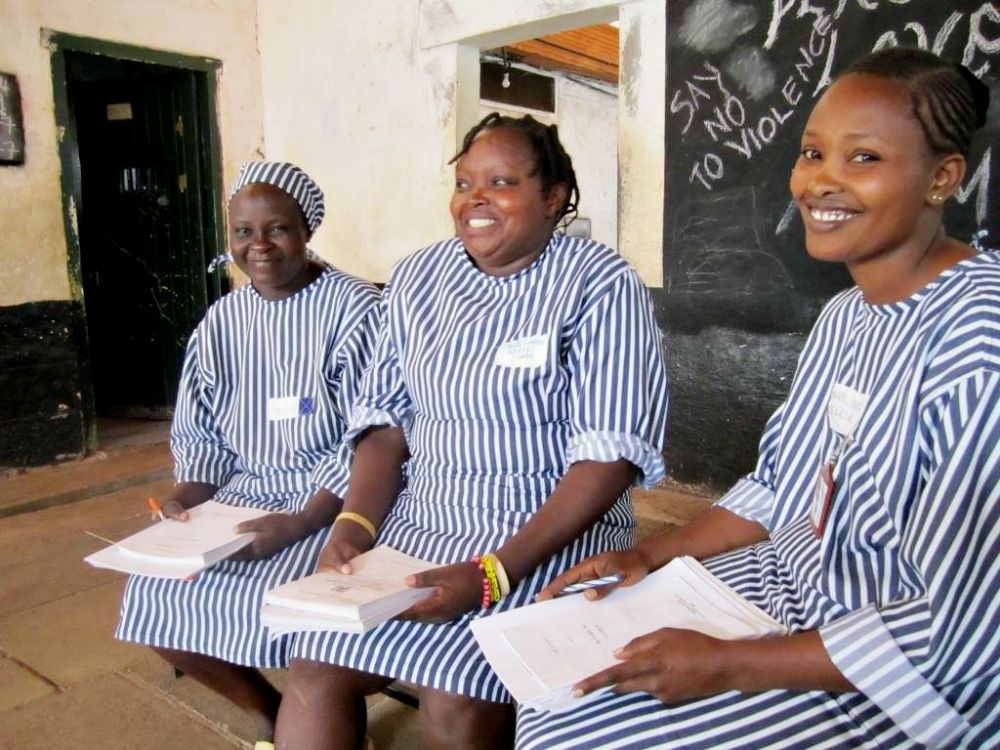
Inmates are taught leadership skills to help them when they leave prison at Langata Women's Prison in Nairobi, Kenya. (Courtesy of the Dimesse sisters)
"They feel very encouraged and they see hope following the visits," said Mokua, who is also a trained nurse and a regular visitor of prisons in the region. "We will continue to visit and give them food to eat and encourage them that this is not the end of life."
Wilson Onyango (not his real name) is serving life imprisonment at the men's Nyahururu Government of Kenya Prison, where sisters also often visit with the guidance of the bishop. He recounted his testimony of finding hope in Christ and succeeding as a preacher after nuns and other religious people guided him to freedom in Jesus Christ.
For five years, Onyango stayed behind bars, awaiting trial after he was accused by his neighbor of attempting to defile a 12-year-old. However, despite the child's testimony against him, Onyango denied the accusation, saying he was framed because he and his neighbor had differences. He persistently asked for the sitting judge to have a DNA test done but the judge refused, saying it was costly and untimely, he alleged.
"I hold no grudges, no anger, no revenge," said Onyango, 37, who has appealed the case. "I forgive those people who falsely testified against me. Christ has given me peace and I will continue to share the Gospel with other inmates."
Advertisement
Esther Wanjiru (not her real name), a former inmate who was released from prison last year, thanked the sisters for reuniting her with her family and community after she spent 10 years behind prison walls.
"My family had rejected me. They said I was an outcast," said the mother of two, who was charged with armed robbery. "But I thank God because they have forgiven me after the sisters visited them before I was released from prison and we were able to reconcile."
Emily Momanyi, a senior superintendent of police, lauded the nuns and other organizations for the donations and support in improving the conditions of prisons in the country. These actions help inmates feel more comfortable in prison while undertaking correctional programs for reintegration into society, she said.
"They should continue visiting inmates in the prisons to support them morally, spiritually and economically," said Momanyi, who is also the officer in charge of Nakuru Women's Prison in the region. "The society should also be educated to help in rehabilitation of the inmates who have completed their sentences to enable them to get away from crime."
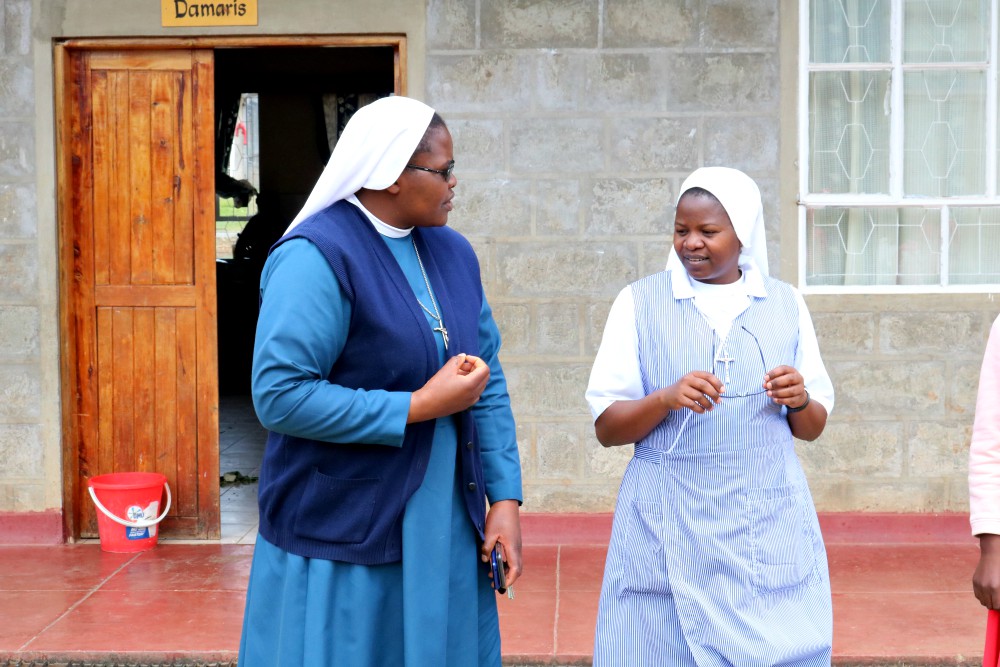
Sr. Redemptor Ikonga (left) chats with Sr. Joyce Nyaga at Talitha Kum Children's Home in Nyahururu, Kenya. (GSR photo / Doreen Ajiambo)
Meanwhile, Nyaga hopes the program will help reduce misbehavior in correctional facilities and recidivism.
She urges religious leaders to show love and compassion to prisoners.
"There is deep fulfillment of the heart when I visit the prisoners," she said. "I want to encourage religious sisters and leaders to show love to those who are suffering."
Ikonga agreed and vowed to leave the comforts of the convent and preach to the prisoners of a new life in Christ.
"I will continue to take the Gospel of love to prisoners," she said. "We need to give them hope that God loves them despite their status in jail."
[Doreen Ajiambo is the Africa/Middle East correspondent for Global Sisters Report.]



